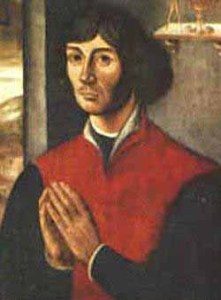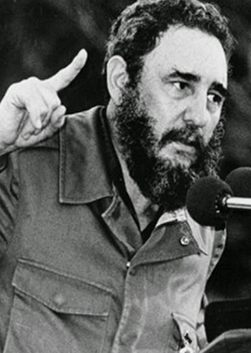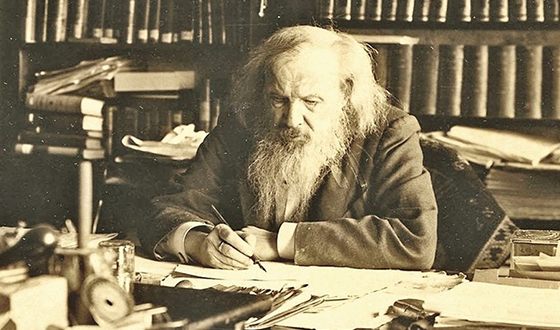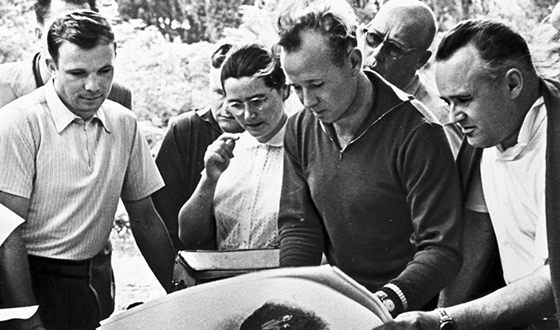Nicolaus Copernicus
 Nicolaus Copernicus is an eminent Polish astronomer who initiated a new understanding of the world system, abandoning the preceding teaching on the position of the Earth as the center of the universe that has existed for many centuries. In his brilliant work “On the rotation of the celestial spheres,” the scientist argues that the observed movements of the celestial bodies are the result of the rotation of the Earth around its axis and the rotation of the planets around the Sun. A brilliant scientist was born, the creator of a new view of the world, in the Polish city of Torun on 02/19/1473 in the family of a merchant who moved with his family from Germany. His father was a native of Krakow, his mother was German. In the family grew four children, Nikolai was the youngest child. Initially, he studied at the school at the church. Unfortunately, during the plague there was no father and the maternal uncle, the canon Luka Watzenrode, took care of the nine-year-old Nicholas. In 1491, together with his elder brother Nicholas went to Krakow, where he entered the university. With exemplary zeal, he studies theology, mathematics, medicine, and enjoys astronomy. He continued his further studies at the University of Bologna, where he entered the law faculty in 1496, where there was a department of civil and canon law. Uncle Copernicus, who became a bishop, helped his nephew’s career. In 1498, Copernicus was approved in absentia by the canon of the Frombork Chapter. From 1500, he studied medicine at the University of Padua, after which he became a doctor of canon law. In Italy, he lived for another three years, practicing medicine. In 1503, he returned to Krakow, where he was at the post of secretary and attorney with his uncle-bishop, at the same time his personal physician. As secretary, Copernicus was a professor at the University of Krakow, and at the same time engaged in astronomical observations. After the death of his uncle, he moved to the small town of Frombork on the banks of the Vistula, where since 1498 he was listed as a canon. Here he took up the main duties of a canon, and devoted all his leisure to astronomy. In addition, he treated patients free of charge, invented and built a hydraulic machine for supplying urban homes with water, he is the author of the draft of the monetary system, which will then be introduced in Poland. Engaged in astronomical research, Copernicus is working on a new, his model of the world. Acquainted with the writings of the ancient philosophers, studying the Ptolemaic system of the world, noting its artificiality and complexity, Copernicus makes a startling conclusion: it is the Sun, and not the Earth, that is the fixed center of the Universe. Ingenious in depth considerations, but due to lack of funds, Copernicus was forced to conduct his observations with the help of the simplest tools made with his own hands. Around 1516, Copernicus wrote his “Minor Comment”, where he set out his hypotheses regarding celestial movements. Copernicus will devote almost 40 years to the full development of the new system. In 1520, during the war with the crusaders, Copernicus assumed the command of a small garrison of Olsztyn, strengthened the defense of the fortress and managed to keep it. After a truce, in the spring of 1521, he was appointed Commissioner of the Warmia. In 1523 Copernicus becomes Chancellor of the chapter. Since 1531, the health of the scientist began to deteriorate, he is engaged only in the development of the heliocentric system and medical practice. After decades of hard work, numerous observations and complex calculations, Copernicus proved that all planets, incl. and the Earth, revolve around the sun. For 365 days, the Earth turns around the Sun, moving in its orbit. This assertion completely refuted the system of the world, which was proposed by Ptolemy and existed by that time for almost 1.5 thousand years. Coinciding with the teachings of the Catholic Church, Ptolemy’s theory was considered unshakable and fully supported by the church. Copernicus avoided persecution by the Catholic Church, although he was accused of heresy. It was only in 1616 that the Catholic Church imposed an official ban on adhering to the theory of Copernicus, which proved the heliocentric system of the world, which contradicted Scripture. From 1616 to 1828 his book has been listed in the Index of the banned books. Before his death, friends and associates brought to the scientist the first printed copy of the work of his whole life “On the Appeals of the Celestial Spheres”. However, Copernicus, who had fallen into whom, did not see this. The great scientist died at home on May 24, 1543 … Here, in Frombork, he was buried in the cathedral. In the XIX century Copernicus monuments were erected in Torn, Krakow, Warsaw, Regensburg. It is interesting that in all countries of the world stamps with portraits of prominent scientists, artists, writers, politicians and military leaders are issued annually. Today you can buy postage stamps in the online store. The Polish astronomer Copernicus is the most popular astronomer by the number of stamps issued in his honor. In 1923, the first brand dedicated to Copernicus was released in Poland. For several decades, all countries have issued stamps dedicated only to their astronomer.
Nicolaus Copernicus is an eminent Polish astronomer who initiated a new understanding of the world system, abandoning the preceding teaching on the position of the Earth as the center of the universe that has existed for many centuries. In his brilliant work “On the rotation of the celestial spheres,” the scientist argues that the observed movements of the celestial bodies are the result of the rotation of the Earth around its axis and the rotation of the planets around the Sun. A brilliant scientist was born, the creator of a new view of the world, in the Polish city of Torun on 02/19/1473 in the family of a merchant who moved with his family from Germany. His father was a native of Krakow, his mother was German. In the family grew four children, Nikolai was the youngest child. Initially, he studied at the school at the church. Unfortunately, during the plague there was no father and the maternal uncle, the canon Luka Watzenrode, took care of the nine-year-old Nicholas. In 1491, together with his elder brother Nicholas went to Krakow, where he entered the university. With exemplary zeal, he studies theology, mathematics, medicine, and enjoys astronomy. He continued his further studies at the University of Bologna, where he entered the law faculty in 1496, where there was a department of civil and canon law. Uncle Copernicus, who became a bishop, helped his nephew’s career. In 1498, Copernicus was approved in absentia by the canon of the Frombork Chapter. From 1500, he studied medicine at the University of Padua, after which he became a doctor of canon law. In Italy, he lived for another three years, practicing medicine. In 1503, he returned to Krakow, where he was at the post of secretary and attorney with his uncle-bishop, at the same time his personal physician. As secretary, Copernicus was a professor at the University of Krakow, and at the same time engaged in astronomical observations. After the death of his uncle, he moved to the small town of Frombork on the banks of the Vistula, where since 1498 he was listed as a canon. Here he took up the main duties of a canon, and devoted all his leisure to astronomy. In addition, he treated patients free of charge, invented and built a hydraulic machine for supplying urban homes with water, he is the author of the draft of the monetary system, which will then be introduced in Poland. Engaged in astronomical research, Copernicus is working on a new, his model of the world. Acquainted with the writings of the ancient philosophers, studying the Ptolemaic system of the world, noting its artificiality and complexity, Copernicus makes a startling conclusion: it is the Sun, and not the Earth, that is the fixed center of the Universe. Ingenious in depth considerations, but due to lack of funds, Copernicus was forced to conduct his observations with the help of the simplest tools made with his own hands. Around 1516, Copernicus wrote his “Minor Comment”, where he set out his hypotheses regarding celestial movements. Copernicus will devote almost 40 years to the full development of the new system. In 1520, during the war with the crusaders, Copernicus assumed the command of a small garrison of Olsztyn, strengthened the defense of the fortress and managed to keep it. After a truce, in the spring of 1521, he was appointed Commissioner of the Warmia. In 1523 Copernicus becomes Chancellor of the chapter. Since 1531, the health of the scientist began to deteriorate, he is engaged only in the development of the heliocentric system and medical practice. After decades of hard work, numerous observations and complex calculations, Copernicus proved that all planets, incl. and the Earth, revolve around the sun. For 365 days, the Earth turns around the Sun, moving in its orbit. This assertion completely refuted the system of the world, which was proposed by Ptolemy and existed by that time for almost 1.5 thousand years. Coinciding with the teachings of the Catholic Church, Ptolemy’s theory was considered unshakable and fully supported by the church. Copernicus avoided persecution by the Catholic Church, although he was accused of heresy. It was only in 1616 that the Catholic Church imposed an official ban on adhering to the theory of Copernicus, which proved the heliocentric system of the world, which contradicted Scripture. From 1616 to 1828 his book has been listed in the Index of the banned books. Before his death, friends and associates brought to the scientist the first printed copy of the work of his whole life “On the Appeals of the Celestial Spheres”. However, Copernicus, who had fallen into whom, did not see this. The great scientist died at home on May 24, 1543 … Here, in Frombork, he was buried in the cathedral. In the XIX century Copernicus monuments were erected in Torn, Krakow, Warsaw, Regensburg. It is interesting that in all countries of the world stamps with portraits of prominent scientists, artists, writers, politicians and military leaders are issued annually. Today you can buy postage stamps in the online store. The Polish astronomer Copernicus is the most popular astronomer by the number of stamps issued in his honor. In 1923, the first brand dedicated to Copernicus was released in Poland. For several decades, all countries have issued stamps dedicated only to their astronomer.



